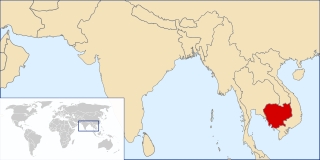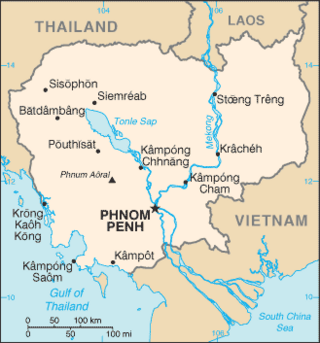The politics of Cambodia are defined within the framework of a constitutional monarchy, in which the king serves as the head of state, and the prime minister is the head of government. In practice, Cambodia is an authoritarian state, as power is centralized in the hands of the Cambodian People’s Party (CPP) under long-standing leader Hun Sen. Civil society groups, independent media and opposition parties are repressed, and elections are not free and fair.

The Cambodian–Vietnamese War was an armed conflict between Democratic Kampuchea, controlled by Pol Pot's Khmer Rouge, and the Socialist Republic of Vietnam. The war began with repeated attacks by the Kampuchea Revolutionary Army on the southwestern border of Vietnam, particularly the Ba Chúc massacre which resulted in the deaths of over 3,000 Vietnamese civilians. On 23 December 1978, 10 out of 19 of the Khmer Rouge's military divisions opened fire along the border with Vietnam with the goal of invading the Vietnamese provinces of Đồng Tháp, An Giang and Kiên Giang. On 25 December 1978, Vietnam launched a full-scale invasion of Kampuchea, occupying the country in two weeks and removing the government of the Communist Party of Kampuchea from power. In doing so, Vietnam put an ultimate stop to the Cambodian genocide, which had most likely killed between 1.2 million and 2.8 million people—or between 13 and 30 percent of the country's population. On 7 January 1979, the Vietnamese captured Phnom Penh, which forced Pol Pot and the Khmer Rouge to retreat back into the jungle near the border with Thailand.

The United Nations Transitional Authority in Cambodia (UNTAC) was a United Nations peacekeeping operation in Cambodia in 1992–93 formed following the 1991 Paris Peace Accords. This was the first occasion in which the UN directly assumed responsibility for the administration of an outright independent state, rather than simply monitoring or supervising the area. The UN transitional authority organized and ran elections, had its own radio station and jail, and was responsible for promoting and safeguarding human rights at the national level.
FCU – UNTAC, the Force Communications Unit UNTAC, was the Australian component of the UNTAC mission in Cambodia.

Pakistan has served in 46 United Nations peacekeeping missions in 29 countries around the world. As of 2023, United Nations (UN) statistics show that 168 Pakistani UN peacekeepers have been killed since 1948. The biggest Pakistani loss occurred on 5 June 1993 in Mogadishu. Pakistan joined the United Nations on 30 September 1947, despite opposition from Afghanistan because of the Durand Line issue. The Pakistan Armed Forces are the fifth largest contributor of troops towards UN peacekeeping efforts, behind India and Rwanda.

United Nations Security Council resolution 668, adopted unanimously on 20 September 1990, after noting the ongoing political discussions and efforts regarding a just and lasting peaceful situation in Cambodia, the council endorsed the political framework that would enable the Cambodian people to exercise their right to self-determination through U.N. organised elections.

United Nations Security Council resolution 718, adopted unanimously on 31 October 1991, after recalling resolutions 668 (1990) and 717 (1991), and noting that at the Paris Conference, a political agreement was signed by parties to the situation in Cambodia, the Council authorised the Secretary-General to submit a report on the costs for the United Nations Transitional Authority in Cambodia, prior to its establishment.

United Nations Security Council resolution 745, adopted unanimously on 28 February 1992, after recalling resolutions 668 (1990), 717 (1991), 718 (1991) and 728 (1992), the council, after examining a report by the Secretary-General Boutros Boutros-Ghali on 19 February 1992, authorised the establishment of the United Nations Transitional Authority in Cambodia (UNTAC), following on from the political settlement agreed in Paris on 23 October 1991. It was the first occasion where the United Nations had taken over administration of a state, as opposed to monitoring or supervising.

United Nations Security Council resolution 766, adopted unanimously on 21 July 1992, after recalling resolutions 668 (1990), 717 (1991), 718 (1991), 728 (1992) and 745 (1992), the Council acknowledged and expressed its concern at the difficulties experienced by the United Nations Transitional Authority in Cambodia (UNTAC) in the implementation of a political settlement in Cambodia signed at the Paris Conference on 23 October 1991.

United Nations Security Council resolution 783, adopted unanimously on 13 October 1992, after recalling resolutions 668 (1990), 717 (1991), 718 (1991), 728 (1992), 745 (1992) and 766 (1992) and noting a report by the Secretary-General Boutros Boutros-Ghali, the council welcomed the progress the United Nations Transitional Authority in Cambodia (UNTAC) had made in Cambodia in accordance with the Paris Agreements, however it recognised various security and economic concerns facing UNTAC.
United Nations Security Council resolution 792, adopted on 30 November 1992, after recalling resolutions 668 (1990), 717 (1991), 718 (1991), 728 (1992), 745 (1992), 766 (1992) and 783 (1992) noting a report by the Secretary-General Boutros Boutros-Ghali, the Council concerned itself with preparations for the 1993 elections in Cambodia by the United Nations Transitional Authority in Cambodia (UNTAC) while condemning the refusal of the Party of Democratic Kampuchea to co-operate.

United Nations Security Council resolution 810, adopted unanimously on 8 March 1993, after recalling resolutions 668 (1990) and 745 (1992), the council, after deploring continuing political violence in Cambodia in violation of the Paris Agreements as well as attacks and detention of members of the United Nations Transitional Authority in Cambodia (UNTAC), discussed upcoming elections to the Constituent Assembly, as part of a process of national reconciliation.

United Nations Security Council resolution 826, adopted unanimously on 20 May 1993, after recalling resolutions 668 (1990), 745 (1992) and 810 (1993), the council supported the five million Cambodians who registered to vote despite violence and intimidation and discussed further preparations for the upcoming elections.
United Nations Security Council resolution 835, adopted unanimously on 2 June 1993, after recalling resolutions 668 (1990), 745 (1992), 810 (1993), 826 (1993) and other relevant resolutions, the council expressed appreciation for the United Nations Transitional Authority in Cambodia (UNTAC) in the aftermath of recent elections in Cambodia.

United Nations Security Council resolution 840, adopted unanimously on 15 June 1993, after recalling resolutions 668 (1990), 745 (1992), 810 (1993), 826 (1993), 835 (1993) and other relevant resolutions, the Council endorsed the results of the 1993 general elections in Cambodia.

United Nations Security Council resolution 872, adopted unanimously on 5 October 1993, after reaffirming resolutions 812 (1993) and 846 (1993) on the situation in Rwanda and Resolution 868 (1993) on the security of United Nations operations, the council stressed the need for an international force in the country and therefore established the United Nations Assistance Mission for Rwanda (UNAMIR).

United Nations Security Council resolution 880, adopted unanimously on 4 November 1993, after recalling Resolution 745 (1992) and other relevant resolutions on Cambodia, the Council concerned itself with the withdrawal of the United Nations Transitional Authority in Cambodia (UNTAC) from the country.

United Nations Security Council resolution 1031, adopted unanimously on 15 December 1995, after recalling all previous resolutions on the conflicts in the former Yugoslavia, the council, acting under Chapter VII of the United Nations Charter, discussed the transfer of authority from the United Nations Protection Force (UNPROFOR) to the multinational Implementation Force (IFOR).

General elections were held in Cambodia between 23 and 28 May 1993. The result was a hung parliament with the FUNCINPEC Party being the largest party with 58 seats. Voter turnout was 89.56%. The elections were conducted by the United Nations Transitional Authority in Cambodia (UNTAC), which also maintained peacekeeping troops in Cambodia throughout the election and the period after it.
The Cambodian Constituent Assembly was a body elected in 1993 to draft a constitution for Cambodia as provided in the 1991 Paris Peace Agreements. The writing of the Cambodian Constitution took place between June and September 1993 and it resulted in the transformation of the political situation of Cambodia from civil-war-marred, autocratic oligarchy to a constitutional monarchy. Achieved under the guidance, auspices and funding of the United Nations Transitional Authority in Cambodia (UNTAC), the drafting of the constitution was the culmination of a larger, $1.6 billion effort to end the decades-old country’s civil wars and bring the warring parties into political, rather than military competition. The result of the process was the creation of a constitution for Cambodia that, at least on paper, guarantees free political competition, regular elections, equal rights and representation and universal suffrage.











